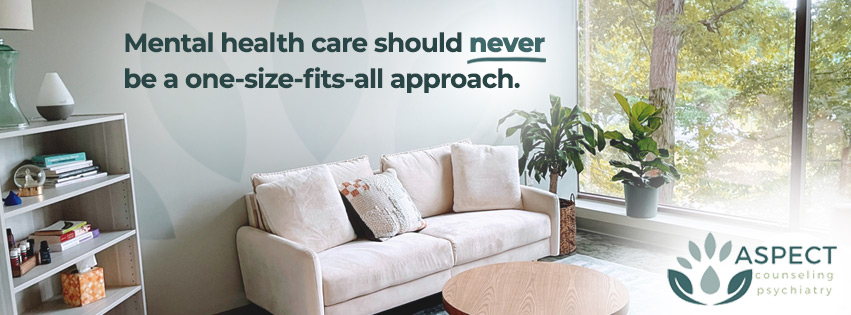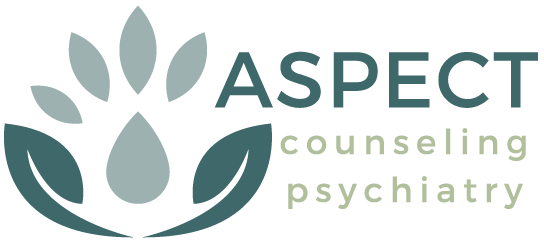If you’re looking for a Dialectical Behavioral Therapy (DBT) program in Richmond, VA, our DBT therapists are here to help.
At Aspect Counseling and Psychiatry, we have professional, licensed therapists with years of experience providing DBT therapy to the Richmond community.

- We’re available for in-person DBT therapy in Richmond, VA, as well as telehealth sessions throughout Virginia
- We have 6 therapists on staff so you can find the perfect fit
- We never take a one-size-fits-all approach; every client is unique
- Our board-certified nurse practitioners (PMHNPs) work in conjunction with our DBT therapists to diagnose conditions, prescribe & manage medications, and order lab tests, if needed
If you’re still wondering whether DBT therapy is right for you, let’s discuss what it is, its benefits, and the types of conditions it is commonly used to treat.
- What Is Dialectical Behavioral Therapy?
- The Benefits of Dialectical Behavioral Therapy
- How Our DBT Therapists Can Help
- DBT Treatment for Various Conditions
- What to Expect During a DBT Session
- DBT vs. CBT: What’s the Difference?
- Dialectical Behavioral Therapy Basics
- Our Therapy Office
- Start DBT Therapy Near You, Today
What Is Dialectical Behavioral Therapy?
Dialectical Behavioral Therapy (DBT) is an evidence-based form of talk therapy that combines cognitive-behavioral techniques with mindfulness practices. Originally developed to treat borderline personality disorder (BPD), DBT is now widely used to help individuals manage intense emotions, improve relationships, and build healthier coping skills.
If you’re searching for “DBT therapy near me,” you’re probably looking for practical tools to handle overwhelming emotions or behaviors that feel out of control. DBT can teach you how to accept where you are while also making positive changes toward the life you want.
So if you’re looking for DBT therapists in Richmond, VA, our licensed professionals can guide you through this process step by step.
The Benefits of Dialectical Behavioral Therapy
DBT is effective because it teaches skills you can use right away. Some of the core benefits include:
Better Emotional Regulation
Learn strategies to reduce mood swings and manage intense feelings.
Healthier Relationships
Improve communication, reduce conflict, and build stronger connections.
Improved Coping Skills
Develop healthier ways to handle stress, triggers, and painful emotions.
Increased Self-acceptance
Balance acceptance and change through mindfulness techniques.
Reduced Self-destructive Behaviors
Many clients experience fewer urges for self-harm, substance misuse, or impulsive decisions.
With the support of a DBT therapist, you’ll gain both awareness and practical tools to handle life’s challenges more effectively.
How Our DBT Therapists Can Help
Our DBT therapists in Richmond are trained practitioners who provide compassionate, nonjudgmental care. Here’s what you can expect when you walk into our office:
- Personalized DBT program tailored to your goals and needs
- Structured therapy sessions that follow evidence-based DBT skills modules (mindfulness, distress tolerance, emotion regulation, interpersonal effectiveness)
- Support for teens and adults struggling with emotional regulation or mental health challenges
- Homework and skill practice to reinforce learning outside of sessions
- Safe, supportive environment where you can talk openly and honestly
When you work with a DBT specialist, you’re not just talking—you’re learning skills that will improve the way you handle thoughts, emotions, and relationships.
DBT Therapists in Richmond, VA
Aspect Counseling and Psychiatry employs several therapists who provide DBT treatment to their clients. Here’s a list of all our DBT therapists.
Click on a therapist to learn more about them & schedule your first session.

Carla Crews
LCSW

Gabby Scalzo
PhD, LCP

Laurie Manns
LPC, CSAC

Mikeyda Travers
LPC

Robyn D’Reaux-Rodgers
LCSW

Shenika Whitaker-Carlos
LCSW, CSOTP
DBT Treatment for Various Conditions
While DBT treatment was originally designed for Borderline personality disorder (BPD), research shows it’s effective for many conditions, including:
- Borderline personality disorder (BPD)
- Depression
- Anxiety disorders
- Attention-deficit/hyperactivity disorder (ADHD)
- Bipolar disorder
- Eating disorders
- Post-traumatic stress disorder (PTSD)
- Substance use concerns
- Self-harm and suicidal thoughts
Because DBT focuses on both acceptance and change, it’s especially helpful for people who feel “stuck” in unhealthy cycles.
Let’s take a closer look at how DBT is used to treat several common conditions.
DBT for Depression
Depression often involves cycles of negative thoughts, hopelessness, and withdrawal. DBT therapy can help by teaching:
- Mindfulness practices to stay present and reduce rumination
- Emotion regulation skills to manage overwhelming sadness or irritability
- Behavioral activation techniques to re-engage in meaningful activities
Over time, these skills can reduce depressive symptoms and help clients feel more balanced and motivated.
DBT for BPD
DBT treatment is considered the gold standard for borderline personality disorder. It helps by:
- Teaching distress tolerance skills to manage intense urges without harmful behaviors
- Building interpersonal effectiveness skills to reduce conflict and improve relationships
- Strengthening emotional regulation to handle rapid mood shifts
- Fostering self-acceptance through mindfulness
For many clients with BPD, DBT provides hope, stability, and long-term improvement in quality of life.
DBT for ADHD
ADHD isn’t just about attention—it often involves emotional impulsivity and difficulty with organization. DBT can help by:
- Teaching mindfulness techniques to improve focus and reduce distractions
- Building distress tolerance to manage frustration and impulsivity
- Using behavioral strategies to improve organization, routines, and follow-through
- Enhancing interpersonal skills to strengthen work and family relationships
When guided by a DBT specialist, these strategies can support both adults and teens with ADHD.
DBT for Bipolar Disorder
Bipolar disorder involves cycles of mania and depression that disrupt daily life. DBT treatment can be used, alongside medication, to:
- Recognize early warning signs of mood episodes
- Apply emotion regulation skills to reduce intensity of mood swings
- Practice mindfulness to stay grounded during high or low periods
- Build healthy routines that support stability and self-care
By combining medical treatment with DBT therapy, many people with bipolar disorder experience greater control and resilience.
At Aspect Counseling and Psychiatry, we often combine therapy with psychiatric care. Our board-certified PMHNPs have advanced nursing degrees, and can prescribe and manage medications to work in conjunction with DBT therapy.
What to Expect During a DBT Session
DBT sessions are highly structured and skills-focused. A typical session may include:
1. Office Check-In
Upon arriving, you’ll check in with our front desk staff. They’ll let the therapist know you are here, and confirm if any of your information needs updating.
2. Therapist Check-In
Review weekly DBT Diary Card that tracks emotions and target behaviors since the last session.
3. Problem Solving
Address challenges or setbacks from the week.
4. Skills Training
Learn and practice specific DBT skills.
5. Real-life Application
Explore how to apply skills in daily life and relationships.
6. Homework Assignments
Reinforce skills outside of therapy.
Adherent DBT involves weekly individual therapy and a skills training group.
DBT vs. CBT: What’s the Difference?
DBT and CBT share some similarities, but they have a few key differences:
Cognitive Behavioral Therapy (CBT)…
- focuses on identifying and changing unhelpful thoughts and behaviors
- is effective for a more broad range of conditions
- is considered a more short-term option, and requires less of a long-term commitment
- has less emphasis on mindfulness and acceptance, compared to DBT
Dialectical Behavioral Therapy (DBT)…
- is a specialized form of CBT that integrates mindfulness, acceptance, and skills training
- is highly effective for emotion regulation and BPD
- is helpful for people who experience extreme emotions
- requires significant time commitment
- is practiced by fewer therapists than traditional CBT
If you’re still looking for therapy near you, give us a call. We can help you decide which type (CBT or DBT) is the best fit for you.
Dialectical Behavioral Therapy Basics
If you’re still curious about how we practice DBT therapy at our office in Richmond…
DBT programs typically last 6 months to a year, though some clients continue longer for ongoing support.
Yes. Our office accepts many forms of insurance, including medicare. Check our insurance page for a complete list of insurance providers.
Absolutely. We offer secure online DBT sessions for clients in Richmond and across Virginia.
No. While DBT was originally designed for BPD, it’s effective for depression, anxiety, ADHD, bipolar disorder, eating disorders, and more.
DBT is effective for both adults and teens. Parents often find DBT especially helpful for adolescents struggling with emotional regulation.
Our Therapy Office
Our therapy office is located in the heart of West End Richmond, in the Innsbrook business complex—at the crossroads of I-64, I-295, Hwy 288, and West Broad St. We share the Liberty Plaza I building with several law offices, financial services companies, and other Richmond-area businesses, at the corner of Cox Rd. & North Park Dr.
4801 Cox Road, Suite 205
Glen Allen, VA 23060
Directions →

Start DBT Therapy Near You, Today
Our licensed DBT therapists in Richmond are here to help. We’ll work with you to create a customized treatment plan that supports your goals.
Call us today or schedule your first session below. With the right support, you can build a life worth living, one step at a time.
